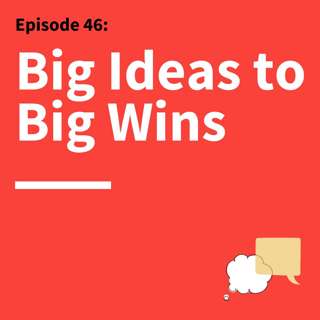
49. Make Numbers Count: How to Communicate Data Effectively
“We have to make data emotional because emotions are what drive us to act,” says Chip Heath, a professor of organizational behavior and author of the new book, Making Numbers Count: The Art of Science of Communicating Numbers. In this interview with host Matt Abrahams, Heath talks about ways that data and statistics can be used to illuminate — or obscure — our message. “A lot of people in the world don’t understand numbers like the numbers people,” he says. “And there are a lot of untranslated numbers that float around in organizations and in society.” Heath suggests thinking about numbers like a foreign language we need to “translate” for our audience: “If we don’t translate numbers into something that’s more tangible, we’re going to sacrifice in a big way.“ Connect:Premium Signup >>>> Think Fast Talk Smart PremiumEmail Questions & Feedback >>> hello@fastersmarter.ioEpisode Transcripts >>> Think Fast Talk Smart WebsiteNewsletter Signup + English Language Learning >>> FasterSmarter.ioThink Fast Talk Smart >>> LinkedIn, Instagram, YouTubeMatt Abrahams >>> LinkedIn
18 Jan 202221min

48. Speaking Up Without Freaking Out: How to Tackle Communication Anxiety
“Eighty five percent of people report being nervous about speaking in public, and I believe the other 15% are lying,” says Matt Abrahams, lecturer in Strategic Communication and podcast host. “What is it about speaking in front of others that makes most of us nervous? Well, those of us who study this ubiquitous fear believe it is part of our human condition.” In this special episode of Think Fast, Talk Smart, Matt Abrahams returns to one of the podcast's main goals: helping people become more confident communicators. Listen to interviews with Stanford University professors who research stress as they share insights into why these feelings affect our communication, and how to overcome them. To find more resources on public speaking anxiety, visit stanford.io/AMP. Connect:Premium Signup >>>> Think Fast Talk Smart PremiumEmail Questions & Feedback >>> hello@fastersmarter.ioEpisode Transcripts >>> Think Fast Talk Smart WebsiteNewsletter Signup + English Language Learning >>> FasterSmarter.ioThink Fast Talk Smart >>> LinkedIn, Instagram, YouTubeMatt Abrahams >>> LinkedIn
5 Jan 202224min

47. Quick Thinks: How to Use Storytelling to Be a Better Founder
“Great founders are great storytellers,” says Stanford Graduate School of Business professor Stephanos Zenios in this “Quick Thinks” episode. Zenios is the director of the Center for Entrepreneurial Studies and heads Startup Garage, a project-based course where teams design and test business concepts that address real-world problems. “Founders have to tell a story to their customer so that they can inspire them to test and use their new product. They have to tell a story to their employees to inspire them to take some risk. And then, they have to tell a story to investors and their board.” Connect:Premium Signup >>>> Think Fast Talk Smart PremiumEmail Questions & Feedback >>> hello@fastersmarter.ioEpisode Transcripts >>> Think Fast Talk Smart WebsiteNewsletter Signup + English Language Learning >>> FasterSmarter.ioThink Fast Talk Smart >>> LinkedIn, Instagram, YouTubeMatt Abrahams >>> LinkedIn
14 Dec 20217min

46. Stay Creative: How to Keep Your Ideas Fresh and Practical
“To be creative, ideas must be both novel and useful. That’s the definition that we use in creativity research,” says Justin Berg, an assistant professor of organizational behavior at Stanford Graduate School of Business. But, he warns: “Novel ideas are often not very useful and useful ideas are often not very novel.”In this episode of Think Fast, Talk Smart, Berg sits down with lecturer and podcast host Matt Abrahams to share lessons from his work on creativity, which has included conducting experiments with both movie directors and circus performers. “The takeaway is that we should never stop being a creator. As managers and executives climb up the organizational ladder, they may benefit from staying involved in the creative R&D side of things, rather than just spend time having ideas pitched to them.” Connect:Premium Signup >>>> Think Fast Talk Smart PremiumEmail Questions & Feedback >>> hello@fastersmarter.ioEpisode Transcripts >>> Think Fast Talk Smart WebsiteNewsletter Signup + English Language Learning >>> FasterSmarter.ioThink Fast Talk Smart >>> LinkedIn, Instagram, YouTubeMatt Abrahams >>> LinkedIn
3 Dec 202123min

45. Recipes From the “Communication Kitchen”: How to Handle Three Common Challenges This Holiday Season
In each episode of Think Fast, Talk Smart, Stanford GSB lecturer and podcast host Matt Abrahams asks his guests the same question: “What are the first three ingredients in a successful communication recipe?” Answers have ranged from specific and poetic, to impactful and thought-provoking. In this episode, we bring you some favorite responses, as well as Matt’s tips for solving three common communication challenges that tend to arise during the holiday season. Connect:Premium Signup >>>> Think Fast Talk Smart PremiumEmail Questions & Feedback >>> hello@fastersmarter.ioEpisode Transcripts >>> Think Fast Talk Smart WebsiteNewsletter Signup + English Language Learning >>> FasterSmarter.ioThink Fast Talk Smart >>> LinkedIn, Instagram, YouTubeMatt Abrahams >>> LinkedIn
18 Nov 202113min

44. Act Like a Leader: How Lessons From The Theater Can Help You Step into Power
"Leadership is a role that you play, like a part you play in other people’s lives. And [your] expression of that role is your responsibility as a leader,” says Stanford GSB lecturer Melissa Jones Briggs. Jones Briggs’ work combines techniques from the theater with social science research to teach lessons about power and communication. In this conversation with host Matt Abrahams, she discusses how acting in a leadership position requires staying present and also knowing when to step back. “Power and authority often determine which stories are centered and which stories are marginalized,” Jones Briggs says. “By uncovering previously untold stories, we can create environments that invite new stories in, and that helps shape inclusive and equitable work cultures.”Connect:Premium Signup >>>> Think Fast Talk Smart PremiumEmail Questions & Feedback >>> hello@fastersmarter.ioEpisode Transcripts >>> Think Fast Talk Smart WebsiteNewsletter Signup + English Language Learning >>> FasterSmarter.ioThink Fast Talk Smart >>> LinkedIn, Instagram, YouTubeMatt Abrahams >>> LinkedIn
11 Nov 202122min

43. Get Psyched: How Time and Situations Shape Our Communication
“Social psychologists believe that if we want to understand our own behavior and the behavior of others, the first thing we have to ask or notice is, ‘What is the situation in which they are performing, in which they are behaving?’ And then we want to know as much about the situation as possible.”In this episode of Think Fast, Talk Smart, Stanford emeritus psychology professor Phillip Zimbardo sits down with host Matt Abrahams to discuss how time influences our perception and our positive or negative thought processes. The two also talk about how the findings of Zimbardo’s most notable (and controversial) study — the 1971 Stanford Prison Experiment — inform our understanding of human behavior. Connect:Premium Signup >>>> Think Fast Talk Smart PremiumEmail Questions & Feedback >>> hello@fastersmarter.ioEpisode Transcripts >>> Think Fast Talk Smart WebsiteNewsletter Signup + English Language Learning >>> FasterSmarter.ioThink Fast Talk Smart >>> LinkedIn, Instagram, YouTubeMatt Abrahams >>> LinkedIn
28 Okt 202121min

42. Space, Pace, and Grace: How to Handle Challenging Conversations
Being a better listener has a lot to do with silence, says Collins Dobbs, a lecturer in management at Stanford Graduate School of Business. “A lot of people are uncomfortable with the smallest modicum of silence, but learning often happens when we create distance for useful reflection.”In this episode of Think Fast, Talk Smart, Dobbs talks with host Matt Abrahams about the importance of “space, pace, and grace” when you’re receiving others’ feedback and handling the emotions that come out during tough discussions. “There’s often a lot more focus on the skill set on delivering emotion than receiving emotion, but if the receiver of emotion can put themselves in a place of curiosity, agency, and openness. . . . opens up a whole new world of possibilities.” Dobbs is an executive coach and teaches several courses, including Interpersonal Dynamics, and Leadership Labs. Connect:Premium Signup >>>> Think Fast Talk Smart PremiumEmail Questions & Feedback >>> hello@fastersmarter.ioEpisode Transcripts >>> Think Fast Talk Smart WebsiteNewsletter Signup + English Language Learning >>> FasterSmarter.ioThink Fast Talk Smart >>> LinkedIn, Instagram, YouTubeMatt Abrahams >>> LinkedIn
15 Okt 202126min






















